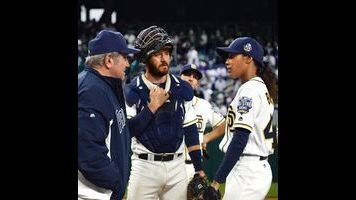It’s hard to pinpoint where a show will go after only its first episode, but in the pilot, Pitch thrives on the power of archetypes. The scared but talented rookie. The gruff but fierce mentor. The seen-it-all coach. The cruel rival. There’s a reason that sports movies tend to follow certain plot beats, and it’s because they’re damn effective. And in the case of the premiere of Pitch, it turns out to be pretty helpful.
A modern professional athlete has a lot of outside noise to contend with, and Ginny Baker (played with calm poise by Kylie Bunbury, also getting her major league debut, to some extent) has even more than usual. The premiere struggles, at times, to fit all of the different plot elements into one episode of television, and it’s perhaps not surprising that the strongest moments are when Ginny’s experiences skew towards the traditional sports story.
But it wouldn’t be a 2016 sports story if she didn’t have a tough-talking agent, an overwhelming amount of media attention, and a social media staffer. There’s an intense amount of detail that has gone into making this all look real. For one thing, there’s the degree to which Major League Baseball itself is involved, from the participation of announcers Joe Buck and John Smoltz to the way the baseball action is filmed. There are times this looks like an actual baseball game, which as a technique has its positives and negatives.
On the one hand, it adds that charming real-life feel. But on the other, baseball is not filmed to highlight dramatic effect, and it can be a little distancing to watch Ginny play as any other player would. Also, given the degree of realism the show is going for, it’s odd that we don’t see Ginny bat during her big redemptive game. Undoubtedly, there was a very conscious choice to put her on a National League team, but the missed opportunity to see her take her first major league at-bat is unfortunate.
Plus, all those Major League Baseball logos start to seem more and more like advertising. And there’s a wildly gratuitous shot of Ginny in a sports bra in the opening of the show that seems designed to show off the Nike logo on it.
The dialogue, also, is not quite as good as it could be. There’s a sense that the script has been focus-grouped into being. Did we really need anyone to utter the phrase “she’s a fighter”? Does the name Jackie Robinson need to be thrown around with such abandon? It’s an obvious comparison, but the show doesn’t really go any further than having people dramatically intone his name and say how this is just like him. Or nothing like him. They even saddle Ginny with the number 43, one more than Jackie.
And yet. There is no focus grouping that can take away the optics of watching a woman play in the majors. It’s almost impossible to watch this show and not be affected by things like a little girl holding a sign saying “Her first game too.” Or, after Ginny pitches a lot better in her second outing and her manager says the phrase “as long as you’re going to be sticking around,” the way she can’t help but smile, just a little.
It seems pretty clear that the show’s strongest relationship is going to be the one Ginny builds with veteran catcher Mike Lawson. A prickly camaraderie created around a shared crushing ambition has a lot of potential. The scenes between Bunbury and a heavily-bearded Mark-Paul Gosselaar spark with more liveliness than any of the others, which is partly because it’s when we get glimpses of who Ginny is beyond the public persona she’s presenting for much of the pilot (a person who thinks Leonardo DiCaprio looks like a fish, it seems).
As to the episode’s big twist, that she’s been imagining the presence of her overbearing father this whole time, it’s too early to say how successful it will be. It runs the risk of being a little facile—sure, some athletes have aggressive parents who mold them into the high-functioning machines they are, but there are also the Katie Ledeckys of the world, who can offer no explanation other than wanting to be really, really good. But that is a little less effective for crafting ongoing plotlines, and when Ginny and her dad went through the “We did it/We ain’t done nothing yet” exchange for the third time, it was just the jolt the show needed to suggest that Ginny isn’t just here to be a novelty. She’s here to be a star. Whether the show lives up to that promise may matter a bit less than shows without the built-in power this one has, but it would be nice.
Stray observations
- Ran out of room for Ali Larter/Mark Consuelos, both of whom are pretty fun. Larter’s description of George Clooney’s Lake Como place being “exactly like San Diego but a million times better” was one of the show’s better lines.
- If no one in this show ever makes an Anchorman joke about what the name of the city means, I will be sorely disappointed.
- While I appreciate the effort the people behind this show have gone to in order to turn my childhood daydreams into a TV show (they even cast Zack Morris!), she should be a shortstop for the White Sox, not a pitcher for the Padres. I’ll try to forgive this misstep, since they did show a winning White Sox box score at one point, which is how I knew this was a fictional world (sad trombone).
- Henceforth, he shall be known as Mark-Paul Catchelaar.









































